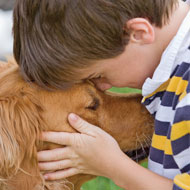
Charity says animals may become tired or stressed
Leading animal charity Dogs Trust has responded to a suggestion that every school should have a dog to help reduce stress in the classroom.
Writing on its website, the charity said the animals may “tire or stress” because the classroom can be “noisy and unpredictable.”
Speaking at the University of Buckingham’s Ultimate Wellbeing in Education Conference, Sir Anthony Seldon - vice chancellor of the University of Buckingham - said: “The quickest and biggest hit that we can make to improve mental health in our schools and to make them feel safe for children, is to have at least one dog in every single school in the country.”
His comments came after education secretary Damian Hinds acknowledged the increasing number of schools taking on “wellbeing dogs” to help children.
Dogs Trust said that “while being around dogs can have huge benefits, the experience in the classroom must be equally enjoyable for the dogs too.
“A classroom can be a noisy and unpredictable place and could tire or stress any dog who visits. Having a dog in every school is not something we’d recommend, and is not likely to be in the best interests of dog welfare."



 The Veterinary Medicines Directorate (VMD) is inviting applications from veterinary students to attend a one-week extramural studies (EMS) placement in July 2026.
The Veterinary Medicines Directorate (VMD) is inviting applications from veterinary students to attend a one-week extramural studies (EMS) placement in July 2026.